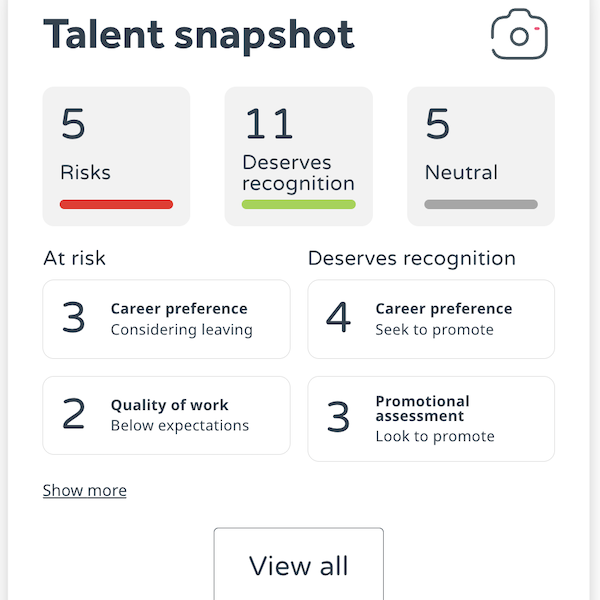Listen and act
A further survey from OnePoll found that the general failure of managers to follow up concerned employees;
26% of respondents said their managers could improve the situation by following up concerns more effectively.
Responding and carrying out actions upon receiving feedback matter. These sentiments are echoed by the results so far from WeThrive’s own survey last year where 45% of respondents have so far reported that when they’ve filled in an employee engagement survey they had either never received feedback following their responses or the specific issues they raised were never discussed with them.
We did a survey and asked people to recall what their best, most satisfying experience of work was like, and almost without exception they say things like this:
The exact words vary from person to person, but these elements of employee experience are clearly vital when it comes to making staff feel positive about work. Interestingly, it is extremely rare for anyone to mention money.
All this got me thinking about what makes a good manager and the negative impact a poor manager can have.
Check out The guide to managing remote teams for inspiration.
Can you ‘become’ a good manager?
The CIPD rightly point out that line managers have an important role to play in supporting employee wellbeing and engagement, they point to the fact that:
‘…proper consideration is given to the way line managers are selected, developed and managed on an ongoing basis to ensure they are able to perform this role.’
However, realistically, we know that this is often not the case. One of the problems is that not everyone is a born ‘people person’, nor do they have effective management skills. Often employees are promoted to line managers because they are good at their day jobs but are not equipped with the skills sets required for a management role.
Although that’s certainly not to say, they cannot make good leaders. With good management development, tools and resources at their disposal, they can be great leaders!
Did you know, In addition to its employee engagement survey tool, WeThrive provides clear next steps so that line managers have a good understanding of what to do next.
The role of the line manager is vital. We’ve established that listening and then acting on employee feedback is crucial but what other tips are there for being a good manager and what are successful managers doing in order to engage with employees?
Qualities of a good manager
1) Listen and act
Even if your organisation doesn’t run employee engagement surveys it’s important to sit down with your staff one to one and ask them how they are.
Where possible when they raise concerns act on them and feedback where you’re at on a regular basis. Of course, you won’t be able to fix everything but showing you want to help can go a long way.
It is possible to show empathy and tow the company line where necessary. The best managers know that showing you are human too can go a long way.
2) Ask for feedback and stick to one to one sessions
Asking for feedback in the form of 360 reviews isn’t always easy and, in my experience, can be a process where neither managers or employees feel particularly comfortable.
Asking for feedback about the way people like to be managed doesn’t have to be as scary as it first sounds. But it is important – in all areas of life more and more we expect our individual needs to be met.
We know one to ones are important but as individuals we vary in how often we need that time from our managers.
So, start by asking how often your employees would like to sit down with you on a one to one basis – some will be happy with once a month, others once a week but however often you agree to do them, stick to them. In order for employees to feel valued this is crucial.
3) Lead by example
A manager’s behaviour will be scrutinised like never before so you must lead by example. If you want your team members to turn up for meetings on time ensure you set a good example and arrive a few minutes early, every time. It won’t go unnoticed.
4) Set achievable goals
If there aren’t any clear goals how will we know if we’re doing a good job? Goals and KPIs are important for setting clear expectations and enabling performance management.
Setting daily, weekly, monthly and yearly goals is important not only for individuals but for the team overall, it will allow you to pull together to help each other in tougher times and celebrate when your team achieve above and beyond what was expected.
5) Be consistent
Where possible manage employees with consistency and save any difficult conversations for those one to ones, not the kitchen.
Don’t be afraid to change to ensure there is consistency across your team. If there is a meeting at 3pm on Wednesday which always fails to start on time because the meeting beforehand overruns then change the time.
6) Don’t micro-manage
This can be tricky, particularly if you’re a new line manager who is conscientious about what you do.
Unfortunately micro-managing doesn’t benefit anyone; not the employee, not the business and not you. We all make mistakes, it’s how we learn and get better. Giving people autonomy in their work empowers them and actually means they are less likely to make mistakes in the first place.
7) Say thank you
Let’s finish off by going back to basics! All the best leaders know that saying thank you is an incredibly powerful motivator and it costs nothing. Unfortunately failing to thank employees means you won’t get the best from them.
A lack of gratitude at work leaves employees feeling unsatisfied, unappreciated and demotivated, all of which have a significant impact on employee happiness and productivity.
Bonus tip – how to have a positive conversation with your staff
Effective communication is a learned and practiced skill. In any conversation it can be hard to raise difficult issues without causing upset, and we know how many managers would love a framework that makes them easier. Try doing it in this order:
Start with something that works
Wherever possible start by talking about something that has gone well. This raises serotonin levels, making both parties feel better. A positive mood improves rapport, raises intelligence and improves communication, and increases the chance of getting an agreement over what to do next.
Move on to what could be better?
Now to the issue(s) at hand. You may have to go over stuff that didn’t quite work, but you risk generating a soup of emotions – embarrassment, resentment at having been left exposed, feelings of guilt or stupidity and so on.
This risks souring the next phase when you’ll need to collaborate to set useful goals. However, in the guide you’ll find a framework for holding a no-blame conversation – practise this hard because it gives you the best chance to get something useful out of the process. Then look at the section on reframing – turning disappointments into opportunities changes the atmosphere and increases the chance of useful change.
c. Now build the future
People are most likely to co-operate fully and change for the better if they feel that you really know what’s getting in the way of success and care about sorting that out.
So, knowledge – careful consideration of comprehensive data – is vital here. If you can home straight in on the places where improvement is most needed and will bring the best results, your team member will sense that you know how to help – that you are acting as a leader, in other words – and will want to join in.
These are the things that really matter, from the employee’s point of view, so you’ll automatically get an easier buy-in for them.
The missing manual for line managers
We know it’s not easy being thrown into a management role without the right guidance. We put together ‘The missing manual for line managers,’ where WeThrive founder and business psychologist Piers Bishop, shares his expert knowledge to provide a simple, practical guide for managers on how to understand people in the workplace, and how to work with these human beings to help them work better.
About WeThrive
Employee Engagement, Evolved
WeThrive is the agile employee engagement platform that uncovers how your people truly feel, enabling managers to create highly effective teams, increase employee retention and employee wellbeing and deliver better business results.
At organisation, team or individual level WeThive’s unique 4cs model leverages the latest psychological understanding to quickly and easily deliver insights, actions and learning content to help your managers become better managers, creating a high performance culture and improving business results. UK based, WeThrive has an average 91% employee engagement survey completion rate and to date has made over 5000 company-wide recommendations.




